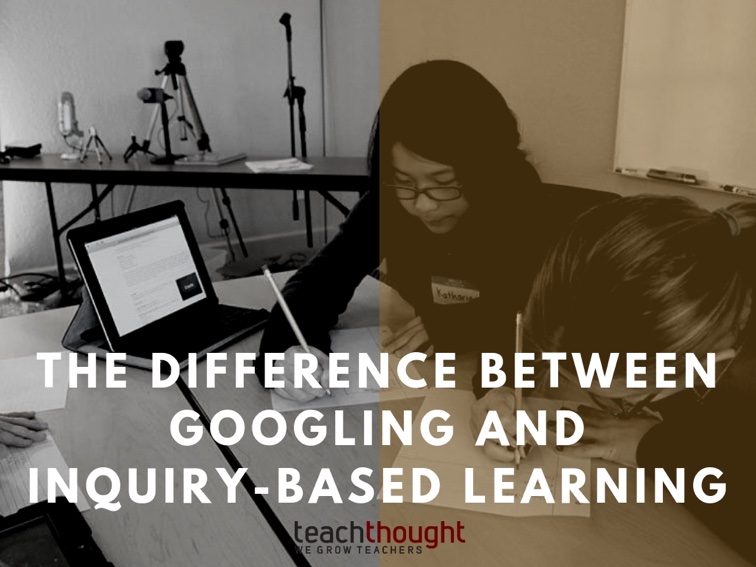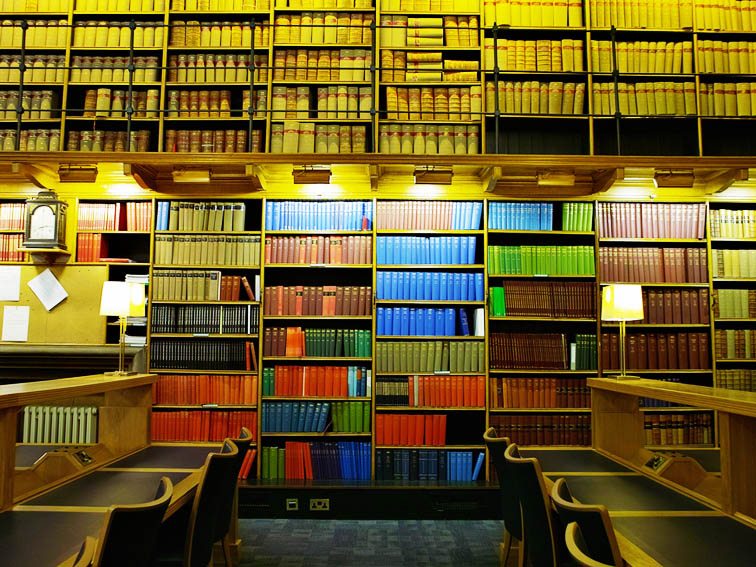
What Is The Difference Between Search And Inquiry?
by Terry Heick
As we recently talked about, Google impacts thinking by putting a universe of information at the end of any internet connection. This is both true and unhelpful. It offers up the universe, but no one needs the universe–they need the right thing at the right time.
A fact.
A connection.
A literacy strategy.
A model.
An image.
A resource.
A new perspective.
And finding that right thing at the right time can be as challenging as finding just the right word for a poem or song for an occasion. Research is often conducted in short bursts when there is library or computer lab time scheduled, often at the beginning of a project, or in the middle when ideas run dry.
This is curious. In an always-on learning environment, constant access is only the beginning. How can we help students find what they need, when they need it?
 The Difference Between Google And A Library
The Difference Between Google And A Library
While other ways of finding information exist (bing) and new ways are surfacing (social search, Quora, etc.) by far the most popular is the noun that has become a verb. ‘Googling’ (Google’ing?) the lyrics from a song, a retailer’s reputation, or the author of a text is often the fastest way to find information.
In fact, I’ll often back out of a website to Google something I’m looking for rather than use built-in search mechanics and navigation. If you can learn the art of the keyword search, along with a handful of other Google tricks and tips you usually can find what you need, or at least where to look next. But the whole “universe at your fingertips” is unhelpful in the sense that what you’ll actually find when you look is strangely limited.
The way Google retrieves information encourages web content creators to use SEO techniques. SEO stands for Search Engine Optimization. It’s not necessarily as nefarious as it sound. We imagine a world where only the very best information and ideas are found. SEO techniques make it easy to find information of limited value, or commercial intent, but there’s a difference between the internet and a library. In open digital spaces, traffic, not knowledge, trumps content goals.
With such a crushing amount of information out there, even Google has to wave the white flag and ask for some help in finding information in the way of massive servers, bots, spiders, and more. They are constantly updating their search engine algorithm in hopes of returning better search results–that is, to help you find what you’re looking for. This makes even trying to ‘please’ the google algorithm like trying to hit a moving target.
This presents a challenge for anyone looking for anything online, much less students with developing search literacy and critical thinking skills.
The Timing of Information
In learning, as with boxing, dancing, selling, and clock-making, timing is everything.
The right question at the right time.
The right assessment at the right time.
The right information at the right time.
When and how students reach out for information often changes the nature of the information they’re reaching out for. Broad, sweeping questions that survey macro-level themes, or minor, detail-oriented questions that represent ‘lower-level’ information. Google struggles with the former dreadfully, as students search for knowledge instead of information.
This is a classic case of user error, but Google encourages it by issuing you 27, 674, 767 search results for even the most outlandish term. But these aren’t answers. They may be entirely irrelevant. They may match phrasing but not at all in terms of context.
There is no single way to make sure students have the proverbial right strategy, data point, question, or connection at the right time. Some of this is teacher instinct, some of it a matter of serendipity. Technology and intimate social networks can help. That’s good.
The juxtaposition between overwhelming information sources and the critical nature of information timing can cause some teachers to pare down data sources for the students, or to improve the quality of research results by adding their own sources. These three websites, these two books, these four essays.
Search Is Different Than Inquiry
Inquiry-based learning is, strangely enough, a matter of inquiry, and inquiry is different than search. Reducing information noise and teaching students to learn to ask the right questions–and then fracture those questions into searchable means–are both near the top of responsibilities for a modern teacher, but teaching learners to do so for themselves might be #1.
The contrast between inquiry and search then, is a matter of pace, volume, and scale. Digital search is always-on and simple and frighteningly fast. The speed at which ‘results’ are issued–and their sheer quantity–obscure the macro perspective real inquiry requires. Pouring over irrelevant book after irrelevant book isn’t perfect either. It can be a huge waste of time, and encourage students to latch on to the first bit of data that seems evenly remotely pertinent.
There can be wisdom in a library, but there’s no reason to make students hate books. They need to see the value of the thing in its natural context. This might suggest a combination of physical and digital resources, and that’s fine too, but isn’t going to change much in your classroom.
The long-term value lies in helping students see the difference for themselves. Search is about finding pieces; knowledge is about knowing the potential value of those pieces; wisdom understands the need to see the big picture, no matter how difficult or seemingly complex or how many perspectives you have to consider or people you have to ask, and put it all together.
And this, collectively, is inquiry.
Image attribution flickr ipohkia and flickeringbrad; Search Is Different Than Inquiry; Google Is Different Than A Library
